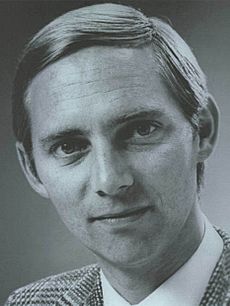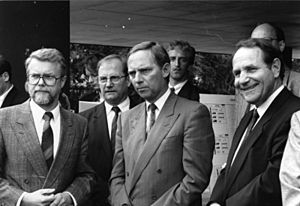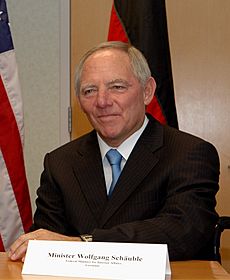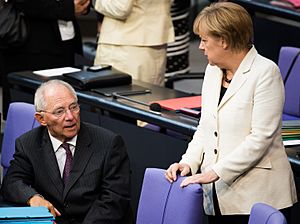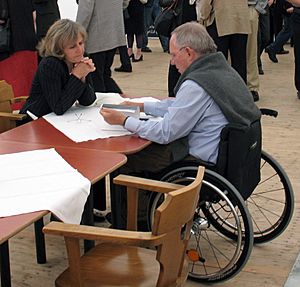Wolfgang Schäuble facts for kids
{{Infobox officeholder | honorific-suffix = MdB | name = Wolfgang Schäuble | image = WSchaeuble.jpg | caption = Schäuble in 2006 | office = Father of the Bundestag | term_start = 26 October 2021 | term_end = 26 December 2023 | predecessor = Hermann Otto Solms | successor = Gregor Gysi | office1 = President of the Bundestag | term_start1 = 24 October 2017 | term_end1 = 26 October 2021 | predecessor1 = Norbert Lammert | successor1 = Bärbel Bas | office2 = Minister of Finance | chancellor2 = Angela Merkel | term_start2 = 28 October 2009 | term_end2 = 24 October 2017 | predecessor2 = Peer Steinbrück | successor2 = Peter Altmaier | office3 = Minister of the Interior | chancellor3 = Angela Merkel | term_start3 = 22 November 2005 | term_end3 = 27 October 2009 | predecessor3 = Otto Schily | successor3 = Thomas de Maizière | chancellor4 = Helmut Kohl | term_start4 = 21 April 1989 | term_end4 = 26 November 1991 | predecessor4 = Friedrich Zimmermann | successor4 = Rudolf Seiters | office5 = Leader of the Christian Democratic Union | 1blankname5 = General Secretary | 1namedata5 = Angela Merkel | term_start5 = 7 November 1998 | term_end5 = 16 February 2000 | predecessor5 = Helmut Kohl | successor5 = Angela Merkel | office6 = Leader of the Opposition | chancellor6 = Gerhard Schröder | term_start6 = 27 October 1998 | term_end6 = 29 February 2000 | predecessor6 = Rudolf Scharping | successor6 = Friedrich Merz | office7 = Leader of the CDU/CSU group in the Bundestag | 1blankname8 = Chief Whip | 1namedata8 = Jürgen Rüttgers
Joachim Hörster
Hans-Peter Repnik | 1blankname7 = First Deputy
| 1namedata7 =
- Wolfgang Bötsch
- Michael Glos
| term_start7 = 25 November 1991 | term_end7 = 29 February 2000 | predecessor8 = Alfred Dregger | successor8 = Friedrich Merz | office9 = Head of the Chancellery
Minister for Special Affairs | chancellor9 = Helmut Kohl | term_start9 = 15 November 1984 | term_end9 = 21 April 1989 | predecessor9 = Waldemar Schreckenberger {{small|(as [[Secretary of state#Germany|Secretary of State])}} | successor9 = Rudolf Seiters | office11 = Chief Whip of the CDU/CSU group in the Bundestag | term_start11 = 4 October 1982 | term_end11 = 15 November 1984 | leader11 = Alfred Dregger | predecessor11 = Philipp Jenninger | successor11 = Rudolf Seiters | office12 = Whip of the CDU/CSU group in the Bundestag | 1blankname12 = Chief Whip | 1namedata12 = Philipp Jenninger | alongside12 = Wolfgang Bötsch, Wilhelm Rawe, Dorothee Wilms | term_start12 = 23 June 1981 | term_end12 = 4 October 1982 | leader12 = Helmut Kohl | predecessor12 = Gerhard Kunz | successor12 = Rudolf Seiters
Agnes Hürland-Büning | office13 = Member of the Bundestag
for Offenburg | term_start13 = 13 December 1972 | term_end13 = 26 December 2023 | predecessor13 = Hans Furler | birth_date = 18 September 1942 | birth_place = Freiburg im Breisgau, Germany | death_date = 26 December 2023 (aged 81) | death_place = Offenburg, Baden-Württemberg, Germany | party = Christian Democratic Union | spouse =
| occupation =
- Politician
- Lawyer
- Civil Servant
| children = 4
| alma_mater =
- University of Freiburg
- University of Hamburg
| website = | signature = Wolfgang Schäuble Signature.svg }}
Wolfgang Schäuble (born 18 September 1942 – died 26 December 2023) was a German politician. He had a very long career in politics, lasting over 50 years. He was a member of the Christian Democratic Union (CDU) party. Schäuble was the longest-serving member of any democratic German parliament. He also served as the 13th President of the Bundestag from 2017 to 2021.
Born in Freiburg im Breisgau in 1942, Schäuble studied law at the University of Freiburg and the University of Hamburg. He started his career as a lawyer. In 1969, he joined the Junge Union, which is the youth group of the CDU party. In 1972, Schäuble was elected to the Bundestag, Germany's parliament. He remained a member of the Bundestag until 2023.
His work as a government minister began in 1984. He was appointed Minister for Special Affairs by Chancellor Helmut Kohl. In 1989, Schäuble became Minister of the Interior. In this role, he helped lead the talks for Germany to become one country again. During this time, he was a very popular politician. People often thought he might become Chancellor himself.
After his party lost the 1998 election, Schäuble became the leader of the CDU. However, he resigned less than two years later due to issues with party funding. In 2005, he became Minister of the Interior again under Chancellor Angela Merkel. In 2009, he became Minister of Finance. He held this important job for almost eight years. He was seen as Germany's second most powerful person after Merkel. He was known for being tough on spending, especially during the eurozone crisis.
On 27 September 2017, Schäuble was chosen to be the President of the Bundestag. He was elected to this position on 24 October 2017. After his party lost the 2021 election, he left this role in October 2021.
Contents
Wolfgang Schäuble's Early Life and Education
Wolfgang Schäuble was born in Freiburg im Breisgau. His father, Karl Schäuble, was a tax advisor and politician. Wolfgang was the middle of three brothers.
After finishing school in 1961, Schäuble studied law and economics. He attended the University of Freiburg and the University of Hamburg. He completed his law studies in 1966 and 1970. This made him a fully qualified lawyer.
In 1971, he earned his doctorate degree in law. His special study was about the legal situation of public accountants.
Starting His Political Career
Schäuble's political journey began in 1961. He joined the Junge Union, which is the youth group of the CDU party. While studying, he led the Christian-Democrat Students association in Hamburg and Freiburg. In 1965, Schäuble officially became a member of the CDU party.
From 1969 to 1972, he was a district leader for the Junge Union. He also served as chairman of the CDU's National Committee for Sport from 1976 to 1984.
A Long Career in Parliament
Schäuble became a member of the Bundestag in 1972. The Bundestag is Germany's national parliament. On 21 October 2017, he became the longest-serving member of parliament in German history. He held this record for many years.
From 1981 to 1984, he was a parliamentary whip for the CDU/CSU group. In November 1991, he became the group's chairman. He stepped down from this role in 2000. Between 2002 and 2005, he served as the group's deputy chairman.
Schäuble was always elected directly by voters in his local area. He did not get his seat through a party list.
Minister for Special Affairs
On 15 November 1984, Chancellor Helmut Kohl appointed Schäuble as Minister for Special Affairs. He also became the head of the German Chancellery, which is like the Chancellor's office. In this role, he handled special tasks for the government.
He was in charge of preparing for the first official state visit of Erich Honecker. Honecker was the leader of East Germany at the time. Schäuble was seen as one of Chancellor Kohl's closest advisors.
Minister of the Interior and German Reunification
On 21 April 1989, Schäuble became Minister of the Interior. This was a very important job. In this role, he led the talks for Germany to become one country again. He worked with East German State Secretary Günther Krause. They signed the Unification Treaty on 31 August 1990. In 1991, Schäuble also argued successfully for moving Germany's capital from Bonn to Berlin.
During the 1990s, Schäuble was one of Germany's most popular politicians. Many people thought he would become Chancellor after Helmut Kohl. In 1997, Kohl even said Schäuble was his preferred successor. However, the CDU/CSU party lost the 1998 election, so Schäuble never became Chancellor.
Leading the CDU Party
After the CDU lost the 1998 federal election, Schäuble took over as chairman of the CDU party from Helmut Kohl. However, he resigned from this position in 2000. This happened because of a party funding controversy involving a large donation. His resignation led to a change in leadership within the CDU. Angela Merkel then became the new CDU leader.
Minister of the Interior (Again)
Before the 2005 elections, Angela Merkel chose Schäuble to be part of her team. He was her expert on security and foreign policy. After the elections, a new government was formed. Schäuble became Minister of the Interior again. This time, he served in a "Grand Coalition" government led by Chancellor Angela Merkel.
Minister of Finance
After the 2009 federal election, Schäuble became Minister of Finance in October 2009. He was 67 years old, making him the oldest minister in the cabinet. He was also the longest-serving member of parliament at that time. By 2014, he was considered Germany's second most powerful person after Chancellor Angela Merkel.
During his time as Finance Minister, Schäuble strongly supported European cooperation. However, he took a firm stance on financial matters, especially with some Southern European countries during the eurozone crisis. He believed in strict spending rules. In 2012, he disagreed with the International Monetary Fund about giving Greece more time to reduce its debt.
Schäuble was a strong supporter of austerity policies, which means strict control over government spending. In 2014, he created a national budget where Germany did not take on any new debt. This was the first time since 1969. This achievement is known as Black Zero. He believed that countries needed to make big changes to their economies to grow.
Schäuble also helped Germany become a founding member of the Asian Infrastructure Investment Bank. He also called for better integration of Islamic finance into the world's financial system.
President of the Bundestag
After the 2017 elections, Schäuble agreed to step down as Minister of Finance. He was then chosen to be the next President of the Bundestag. This is a very important role, as he led the parliament's meetings. He also chaired the Council of Elders, which helps decide the daily agenda and committee leaders.
As Bundestag President, Schäuble worked to manage the debates and actions of all parties. He represented Germany at important international events, like the funeral of U.S. Senator John McCain in 2018.
After the 2021 federal election, his party was no longer the largest. By tradition, the largest party chooses the President of the Bundestag. So, Bärbel Bas was elected as his successor. Schäuble remained a Member of the Bundestag. As the longest-serving member, he oversaw the opening session of the new Bundestag.
Wolfgang Schäuble's Political Views
European Cooperation
Schäuble was a strong supporter of European cooperation. In 1994, he suggested that some European Union countries could move faster with integration. This would include things like a shared currency and common foreign policies. He believed that countries like Britain were important for Germany because they shared similar economic ideas.
In 2015, the Finance Minister of Greece, Yanis Varoufakis, called Schäuble "the intellectual force" behind the idea of a united European currency. Schäuble also suggested that the European Commission should have less power over rules. He thought member states should work together more directly to solve problems.
Foreign Relations
Schäuble was known for supporting strong ties with the United States. In 2002, before the Iraq War, he criticized the German Chancellor for weakening international pressure on Iraq. He later defended the United States' decision to invade Iraq in 2003. However, he said he was "doubtful" about the war because it was a one-sided decision by the US.
He also compared Russia's actions in Crimea to historical events. He said that Vladimir Putin's claims about protecting ethnic Russians were similar to Adolf Hitler's claims in 1938.
Policies at Home
In 1999, Schäuble's party campaigned against allowing people to have double citizenship. However, he later said that immigration was good for Germany. He believed that politicians needed to explain this better to people. He said that Germany needed immigration, just like it used refugees after World War Two to rebuild. He also stated that "people are right to fear Islamist terrorism. But not Islam." In 2015, he urged European Union countries to create a common law for asylum seekers.
Schäuble attended the re-opening of Germany's largest synagogue in 2007. He also banned two right-wing groups that denied the Holocaust. In 2009, he banned another far-right group that promoted racist ideas to children.
Between 2015 and 2016, Schäuble helped secure a large amount of funding for Holocaust survivors. In June 2017, he voted against Germany's introduction of same-sex marriage.
National Security
Schäuble often called for stronger policies to fight terrorism. After a terrorist plot in 2006, he said Germany was lucky to avoid a large attack. He suggested allowing the military to be used for security within Germany. He also thought Germans should discuss ideas like holding people suspected of terrorism without trial.
In 2007, Schäuble proposed laws that would allow the government to carry out targeted killings of terrorists. He also wanted to outlaw using the internet and cell phones to support terrorists. After the attacks in Paris in 2015, he called for Europe-wide laws to track money used by terrorists.
Other Activities
Boards and Foundations
Wolfgang Schäuble was involved in many other organizations. He was the Deputy Chairman of the Supervisory Board for KfW, a German development bank. He was also a member of the Board of Governors for the Asian Infrastructure Investment Bank.
He served on the boards of trustees for several non-profit organizations. These included the Friends of the Festspielhaus Baden-Baden, the Deutsche Nationalstiftung, and the Deutsche Stiftung Denkmalschutz. He was also a trustee for the Deutsches Museum and the Max Planck Society. He was a member of the Board of Directors for the Robert Schuman Foundation.
Awards and Recognition
Honorary Degrees
- 1992: Honorary Doctorate from the University of Erlangen-Nuremberg
- 2005: Honorary Doctorate from the University of Fribourg
- 2006: Honorary Doctorate from the University of Warmia and Mazury in Olsztyn
- 2009: Honorary Doctorate from the University of Tübingen
- 2011: Honorary Doctorate from the Corvinus University of Budapest
Other Honors
- 1986: Order of Merit of the Italian Republic
- 1988: Grand-Officier de l'Ordre National du Mérite by the President of France
- 1989: Grand Commander of the Order of Merit of the Federal Republic of Germany
- 1991: Grand Cross 1st class of the Order of Merit of the Federal Republic of Germany
- 1998: Konrad-Adenauer-Preis
- 1998: Ordre national de la Légion d'honneur
- 2008: Order of Merit of Baden-Württemberg
- 2010: Toleranzpreis der Evangelischen Akademie Tutzing
- 2011: Order of the Oak Crown of the Grand Duchy of Luxembourg
- 2012: International Charlemagne Prize of Aachen
- 2014: Award for Understanding and Tolerance of the Jewish Museum Berlin
- 2015: Bambi Award
- 2016: Leopold Kunschak Prize
- 2017: Kissinger Prize
- 2017: Member of the Académie des Sciences Morales et Politiques
- 2019: Grand Officer of the Order of the Three Stars
- 2022: Grand Cross of the Hungarian Order of Merit
Personal Life
Schäuble married Ingeborg Hensle in 1969. She is an economist and teacher. They had four children: three daughters (Christine, Juliane, and Anna) and one son (Hans-Jörg). His brother, Thomas Schäuble, was also a politician. His son-in-law, Thomas Strobl, is currently the Interior Minister of Baden-Württemberg.
The Schäubles lived in Gengenbach before moving to Offenburg in 2011. They also had an apartment in Berlin.
When Schäuble turned 70 in 2012, Chancellor Angela Merkel and Christine Lagarde (from the International Monetary Fund) gave speeches in his honor.
Assassination Attempt
On 12 October 1990, Wolfgang Schäuble was the target of an assassination attempt. This happened shortly after Germany became reunified. A man named Dieter Kaufmann fired three shots at him after an event. Kaufmann injured a bodyguard and severely injured Schäuble's spinal cord and face.
Schäuble was left paralysed from the attack. He used a wheelchair for the rest of his life. The attacker was declared mentally ill by the judges. He was sent to a clinic and later released in 2004.
Despite his injuries, Schäuble returned to work within three months. He was still in rehabilitation, learning to live with paralysis. Chancellor Helmut Kohl visited him for his first public appearance after the attack.
Health and Passing
In May 2010, Schäuble faced serious health issues. He was in intensive care due to complications from an operation and an allergic reaction. There was talk that he might resign, but Chancellor Angela Merkel asked him to stay.
Wolfgang Schäuble passed away from cancer on 26 December 2023. He was 81 years old.
Selected Books by Wolfgang Schäuble
Schäuble wrote several books, including:
- Der Vertrag. Wie ich über die deutsche Einheit verhandelte (The Treaty: How I Negotiated German Unification, 1991)
- Und der Zukunft zugewandt (Looking to the Future, 1994)
- Und sie bewegt sich doch (And Yet It Moves, 1998)
- Mitten im Leben (In the Prime of Life, 2000)
- Scheitert der Westen? Deutschland, Die neue Weltordnung (Is the West Failing? Germany and the New World Order, 2003)
- Zukunft mit Maß. Was wir aus der Krise lernen können (Future of Moderation: What We Can Learn from the Crisis, 2009)
- 60 Jahre Grundgesetz: Verfassungsanspruch und Wirklichkeit, in: Robertson-von Trotha, Caroline Y. (ed.): 60 Jahre Grundgesetz. Interdisziplinäre Perspektiven (= Kulturwissenschaft interdisziplinär/Interdisciplinary Studies on Culture and Society, Vol. 4), Baden-Baden 2009
Images for kids
See also
 In Spanish: Wolfgang Schäuble para niños
In Spanish: Wolfgang Schäuble para niños
 | Precious Adams |
 | Lauren Anderson |
 | Janet Collins |


